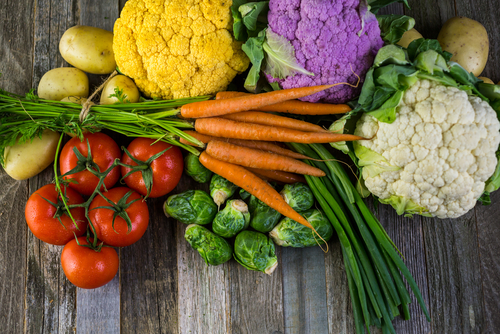Summer is arguably the greatest season there is. Not only can we get outside in the sunshine and fresh air and move our bodies more, but we can start eating healthier as well. That’s right, summer is when we can buy and eat local produce from our farmers’ markets and even our own backyard!
Many locally-grown fruits and vegetables are at their peak in summer, which means they offer a ton of essential vitamins and nutrients. So, which are the best fruits and veggies to take advantage of this summer? Read on to find out!
Tomatoes
Tomatoes have to be one of the most delicious and versatile fruits (yes, they’re technically fruits) on the planet. They can be eaten raw or cooked, come in all different colors and varieties, and are quite easy to grow with a little help. Not only are tomatoes loaded with antioxidants and vitamin C, they also contain beneficial phytochemicals such as lycopene, which help prevent chronic diseases—especially cancer.
Zucchini
Zucchini simply doesn’t get the love it deserves. Part of the summer squash family, zucchini contains and important fiber called pectin, which is linked to increasing heart health and lowering cholesterol.
Watermelon
When watermelons hit the grocery stores, you know summer has arrived. A staple of summertime fun and festivities, watermelons are the perfect sweet and juicy treat on a hot day. And, as their name suggests, watermelons have a high water content, which keeps you cool and hydrated. Like tomatoes, watermelons provide lycopene, which is effective at preventing certain cancers and protecting skin cells from sun damage.
Celery and Fennel
Know what a bathing suits worst enemy is? Puffiness! Many of us are carrying around excess water weight. If you’re nodding your head, you’ll want to eat more celery and fennel this summer, as these act as natural diuretics, helping your body shed that water weight but without causing dehydration.
Cantaloupe
Another summertime favorite, cantaloupe, as well as honey dew melons, also act as diuretics. Cantaloupes are also an excellent source of antioxidants like vitamin C and vitamin A (in the form of carotenoids). They boast significant amounts of potassium, folate, copper, B vitamins, vitamin K, magnesium, and fiber as well.
Raspberries
Raspberries (and blackberries) are fantastic sources of fiber. In fact, raspberries offer 8 grams of fiber per cup, as well as a lot of vitamin C. Though they may be a bit expensive off-season, these berries are affordable when purchased from your local farmers, or grown in your own backyard, where they’ll come back year after year.
Peaches, and Nectarines
As a kid I had the hardest time remembering which one was fuzzy and which one was smooth. Fuzzy or smooth, these delicious pit fruits offer dietary fiber and vitamins A and C. Oh, and they also happen to be delicious, so eat them raw, or bake them into pies and tarts.
Dark Leafy Greens
Summertime is when most people actually make and eat salads at just about every meal. But instead of making ho-hum salads with iceburg lettuce, use dark leafy greens like spinach and kale this summer.
The Carotenoids in dark leafy greens get converted into vitamin A in your body, and vitamin A protects your skin from sun damage and keeps your eyes nice and healthy.
Strawberries and Blueberries
We couldn’t create a list of summertime fruits without including strawberries and blueberries, now could we?
These two berries are not only sweet and juicy, they also offer high amounts of flavonoids, powerful disease fighters that also increase blood flow to skin and decrease sensitivity to light. Consider starting your day with a fruit smoothie and don’t be stingy with those berries.
Avocados
Depending on where in the country you live, the delicious avocado may or may not be sourced locally. But that’s okay. They are such a healthy source of monounsaturated fat and other nutrients, that you should definitely try and eat more this summer.
When you think about it, summer is the perfect time to recalibrate your gut. Since you have access to so many wonderful fruits and vegetables, you can easily and deliciously clean up your diet and prepare your GI tract to be populated with friendly bacteria.
Did you know gut health contributes to your overall health? Did you know gut health contributes to your overall health? More specifically, it has a direct impact on your Joints! More and more studies are finding that the microbiome bacteria living in our gut has a directly correlation with joint health problems such as arthritis and joint pain. Click Here to find out more.
 Validating...
Validating... 






Leave a Reply